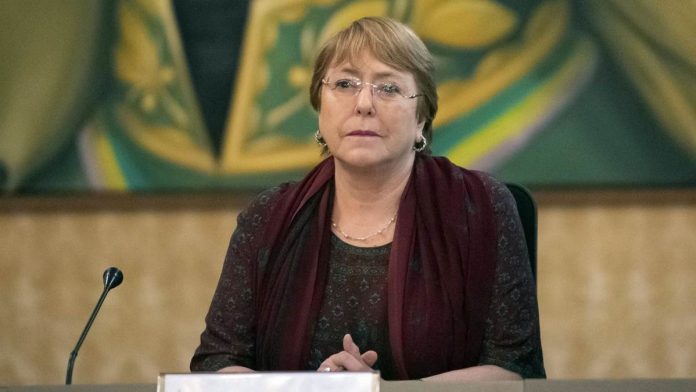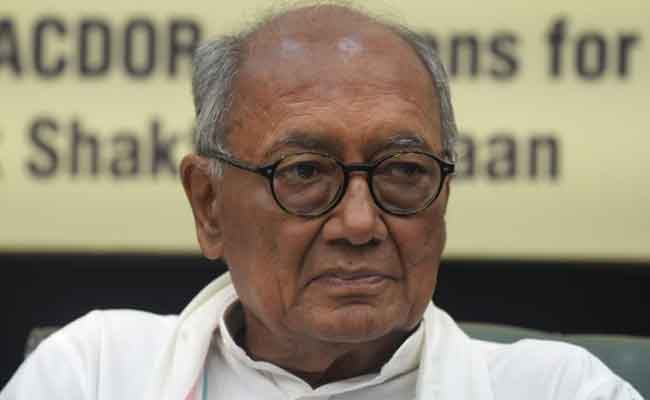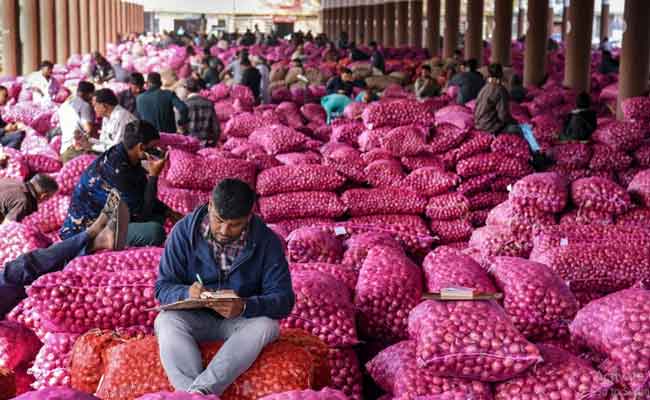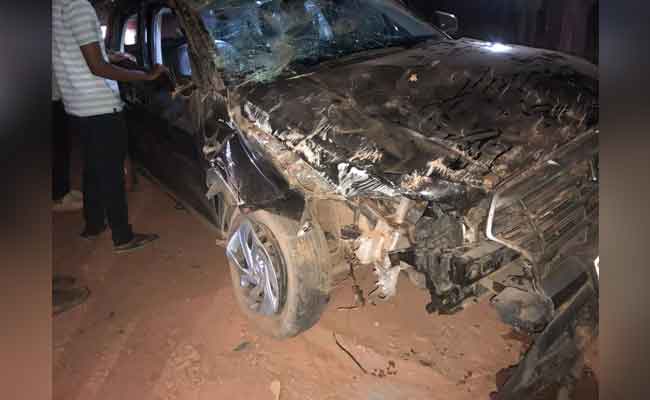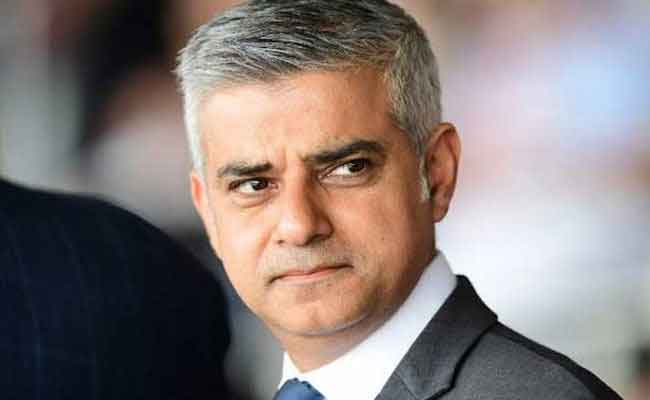Geneva, Feb 26: UN human rights chief Michelle Bachelet on Friday expressed hope that the ongoing dialogue efforts between the Indian government and the farmers protesting against the new farm laws will lead to an "equitable solution" to the "crisis" that respects the rights of all.
Updating the UN Human Rights Council on recent human rights issues in more than 50 countries, including China, Pakistan and Russia, Bachelet also criticised the action taken against journalists and activists covering the protests by farmers and efforts to curb freedom of expression on social media.
Responding to Bachelet's statement, Ambassador Indra Mani Pandey, Permanent Representative of India, said that the Government of India has set a goal of doubling the income of farmers by 2024.
"The purpose of enacting three Farm Acts is to enable farmers to realise better price for their produce and enhance their income. It will particularly benefit small farmers and offer more choices to those farmers who opt for them.
"The Government has shown utmost respect for protests by farmers and has remained engaged in dialogue with them to address their concerns," Pandey said in his National Statement.
In her statement, Bachelet said, "In India, continued protests by hundreds of thousands of farmers highlight the importance of ensuring laws and policies are based on meaningful consultations with those concerned."
"I trust that ongoing dialogue efforts by both sides will lead to an equitable solution to this crisis that respects the rights of all," she said.
Thousands of farmers have been camping at several Delhi border points since November last year, demanding the government to repeal three farm laws and provide them legal guarantee of minimum support price (MSP) for their crops.
Multiple rounds of talks between the government and farmer unions have not been able to resolve the deadlock.
India has emphasised that the protests by farmers must be seen in the context of India's democratic ethos and polity and the Ministry of External Affairs said that some vested interest groups have tried to mobilise international support against the country.
"Before rushing to comment on such matters, we would urge that the facts be ascertained, and a proper understanding of the issues at hand be undertaken," it said earlier this month.
In her speech, Bachelet said, "Charges of sedition against journalists and activists for reporting or commenting on the protests, and attempts to curb freedom of expression on social media, are disturbing departures from essential human rights principles."
She also said the UNHRC was monitoring the situation in Jammu and Kashmir, where restrictions on communications continued to be a concern.
Ambassador Pandey said that the constitutional changes in the status of Jammu and Kashmir made by Parliament in August 2019 were a historic decision.
"It has been welcomed by the people of India, including people of Jammu and Kashmir. It has given impetus to socio-economic development, end decades of discrimination and combat cross border terrorism, which has been the key hindrance in full enjoyment of human rights by the people, Pandey said.
"We have restored grassroots democracy, through District Development Council (DDC) elections, and provided good governance through the Back to Village' initiative. There has been a significant decline in terrorist attacks and progressive national laws have been extended to Jammu & Kashmir to enable the people there to enjoy the same rights as the people in rest of India," he said.
"Given these developments, we were perplexed to note some of the comments by the High Commissioner. She appeared as oblivious of the enormous efforts made by my Government to address the challenges, as indeed of many of the factors driving these challenges," the senior diplomat said.
Pandey said the "unprovoked violence on our Republic Day in the name of farmers' rights, apparently, left her (Bachelet) unmoved.
"Her indifference to terrorism is, of course, not new. Objectivity and impartiality have to be the hallmarks of any Human Rights assessment. We are sorry to see that the High Commissioner's oral update is lacking in both."
In her address, Bachelet also said that with regard to inclusion and participation, she was encouraged by the recent experience of her office in a pilot programme in Kerala, where officials, civil society organisations and community leaders used innovative technology to ensure that the voices of marginalised and poor people are heard, and their needs addressed, in the pandemic response.
Let the Truth be known. If you read VB and like VB, please be a VB Supporter and Help us deliver the Truth to one and all.
Rajgarh (MP) (PTI): Prime Minister Narendra Modi's political history is based on the "Hindu-Muslim dispute" and he should do some soul-searching as to who is benefiting from it, senior Congress leader Digvijaya Singh has claimed.
Singh, who has been fielded by the Congress from Rajgarh Lok Sabha seat in Madhya Pradesh, also said that he was not satisfied with the recent Supreme Court ruling on Electronic Voting Machines (EVMs).
The former Madhya Pradesh chief minister spoke to PTI while campaigning in the rural areas of Raghogarh assembly segment that falls under Rajgarh parliamentary constituency.
"If you look at the political history of Modi ji, it is based on the Hindu-Muslim dispute. It would be better if Narendra Modi does some soul-searching as to who is benefiting from it and who all are suffering due to it," Singh said.
Polling will be held in Rajgarh in the third phase of the Lok Sabha polls on May 7.
Singh targeted the BJP for seeking votes on lines of caste and religion instead of real issues.
He asked, "Where are polls being fought on the basis of real issues?"
The BJP has attacked the Congress over issues like inheritance tax. It has accused the Congress of planning to snatch the OBC quota to give it to Muslims as well as to "redistribute wealth to infiltrators".
Singh also hit out at the "Gujarat model of development", saying, "If you look at the Human Development Index (HDI) of Gujarat, then you will find that it doesn't even figure among the top 10 (states) in the country."
On the BJP's slogan 'Ab ki baar, 400 paar', Singh said the BJP managed to predict the number of seats it would win in the 2014 and 2019 Lok Sabha polls with "total precision".
"If you look at 2014 and 2019, whatever figure they gave, they crossed it. In 2014, they gave the slogan of '272 paar' and won 284 seats. Similarly, in 2019, they gave the slogan '300 paar' and won 303 seats."
Asked if he believes that EVMs had a role in the BJP's electoral success, Singh said, "At least I believe in this."
He also said he was not satisfied with the Supreme Court's recent ruling on EVMs but would talk about it after the polls.
Terming the suspicion of manipulation of the EVMs "unfounded", the Supreme Court had on April 26 rejected the demand for reverting to the old paper ballot system, saying the polling devices were "secure" and eliminate booth capturing and bogus voting.
A bench of Justices Sanjiv Khanna and Dipankar Datta, which dismissed the PILs seeking a return to the ballot paper system, said repeated and persistent doubts and despair, even without supporting evidence, can have the "contrarian impact of creating distrust".
On the reduced voter turnout in the first two phases of the Lok Sabha polls compared to the 2019 elections, the Congress leader said, "Firstly, the people have doubts about whether their vote is getting registered at the right place in the EVM. Secondly, there is a lot of pressure on the people to vote and that's why they have no interest in voting."
The third factor could be the prevailing heatwave, he said.
"There is also a general lack of enthusiasm among voters about elections this time," claimed Singh, who had lost to the BJP's Pragya Singh Thakur from Bhopal Lok Sabha seat last time.
This time, Singh is pitted against sitting BJP MP Rodmal Nagar.
Nagar has held Rajgarh seat since 2014.
Singh had won the seat in 1984 and 1991. His younger brother Lakshman Singh represented the constituency for five terms as a BJP candidate.
In 2009, Singh's protege Narayan Singh Amlabe was elected from Rajgarh.
Rajgarh constituency has 18,69,937 eligible voters, including 9,60,505 men, 9,09,409 women and 23 third gender persons.

